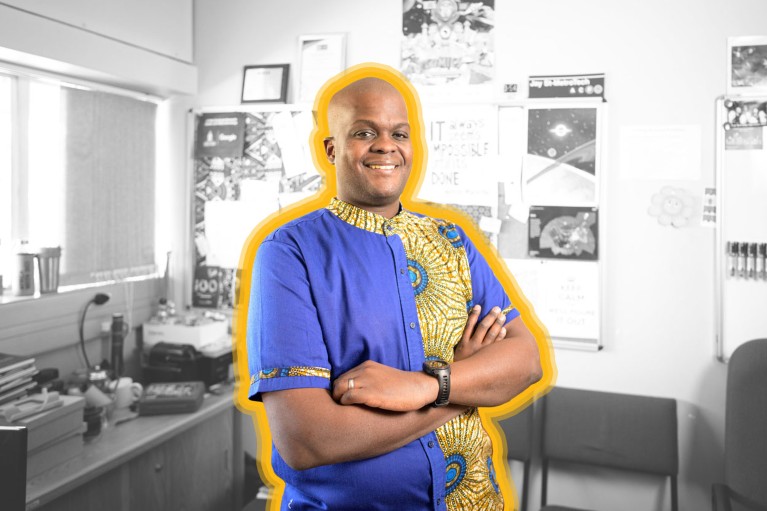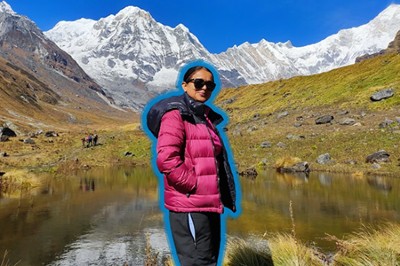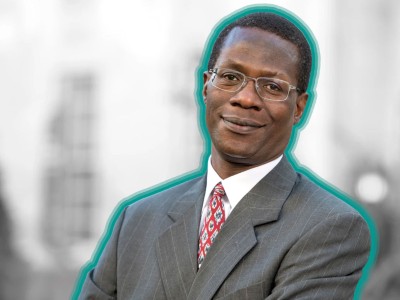
Knowledge scientist Vukosi Marivate has helped to construct scientific communities and networks for African researchers in machine studying and synthetic intelligence (AI).Credit score: Mariki Uitenweerde, EYEscape Company Pictures
Throughout his PhD in the USA, laptop scientist Vukosi Marivate found each the facility of inclusive areas and the sense of isolation created by non-diverse gatherings. Since then, Marivate, now an information scientist on the College of Pretoria in South Africa, has been constructing a crucial mass of African knowledge scientists — in order that their voices may be a part of the synthetic intelligence (AI) revolution.
In 2016, Marivate and his fellow researchers established the Deep Studying Indaba convention (in Bantu languages, indaba means a session or an vital dialogue) to assist to construct a area people round machine studying and AI. The 2023 convention, held in Accra, Ghana, attracted 800 researchers from greater than 62 international locations, half of which had been in Africa.
Trekking throughout Nepal to bridge its gender hole within the sciences
Marivate additionally co-founded Masakhane, a grass-roots group of greater than 1,000 researchers, software program builders and language specialists from 30 African international locations, which goals to provoke analysis in pure language processing in African languages, for and by Africans. Pure language processing makes use of machine-learning strategies to course of textual content and speech, for functions reminiscent of translation and transcription. Traditionally, Africa’s 2,000 languages have been uncared for in digital merchandise. Certainly one of Masakhane’s initiatives created bespoke scientific phrases for African languages, and the group continues to generate African-led AI analysis teams and corporations on the continent.
When did you notice that you simply wished to deal with the dearth of range in science?
Throughout my PhD at Rutgers College in New Brunswick, New Jersey, I keep in mind going to the Worldwide Convention on Machine Studying, one of many world’s high conferences on the topic. I walked right into a room stuffed with folks and on the opposite facet of the large corridor was the one different Black particular person there. It messes together with your thoughts and also you begin asking, “What’s taking place right here? Why are there solely two of us?” You are feeling as if you don’t belong.
That’s why I would like to make sure that I open doorways to others. It’s about entry. How will we make it possible for the people who find themselves making use of for worldwide funding or fellowships higher symbolize the African continent, and assist them to appreciate that they are often wonderful, like anyone else?
I additionally learnt that it doesn’t essentially should be me who helps them: it’s about utilizing the community, asking who else is working in these topic areas — in the identical nation or on the continent — after which asking how I can join college students who’re in these areas. The Deep Studying Indaba and Masakhane are networks which can be a lot, a lot greater than any particular person.
Why is range, fairness and inclusion (DEI) work vital?
‘Anybody participating in scientific apply shouldn’t be excluded’: the UK’s solely Black chemistry professor, on range
When you begin participating with science in a societal manner, you see that the people who find themselves actually pushing for innovation to return into their communities are usually very totally different from those that are chasing the very best ranges of status of science.
I believe one of the best of us are nonetheless to return. Younger folks on the African continent are going to take action far more than us, older scientists. They’ve higher networks; they’ve extra world recognition of the work that they do. We’re going to have wonderful work come from these younger folks and others who are usually not usually represented in these areas.
What obstacles do Africans face in world AI and computing areas?
The AI researcher archetype tends to be male, white and from the worldwide north. We’re attempting to say that your race, incapacity, gender and even your geographical space shouldn’t matter. We wish folks to really feel snug, in order that they are often themselves and produce their full selves into AI and computing areas, with out altering themselves to suit into the system.
The opposite limitations embody funding and the pressures on college students. For instance, many South African college students are prone to be breadwinners at house and are sometimes pushed in direction of non-research business jobs. How will we make it possible for those which have that spark discover locations within the self-discipline and have choices?
Who has been your greatest affect or mentor?
One is Tshilidzi Marwala, a South African AI engineer and rector of the United Nations College in Tokyo. Again in 2006, I used to be learning engineering on the College of the Witwatersrand (Wits) in Johannesburg, and wished to work for a giant engineering firm and make cash. Marwala stated, “There are extra fascinating issues on the market on the earth that you simply may wish to take a look at.” His laboratory was at Wits on the time, and there I noticed individuals who appeared like me, who had backgrounds much like mine. That have modifications you. He was additionally so beneficiant with everybody, asking, “How will we open alternatives for you?” That was a serious turning level in my scientific life.

